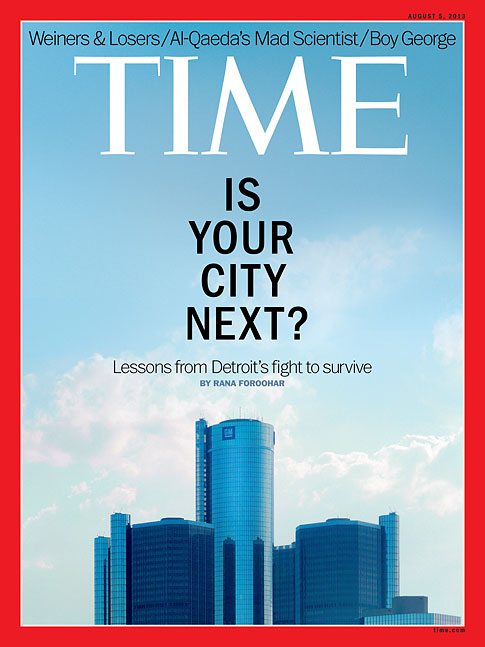
The lights have gone out in detroit, literally. Forty percent of the streetlights don't work, since there isn't enough money to keep them on, or up, in a city that some 60 years ago was the richest in the country and perhaps the world. But that was another time, when the city's manufacturing might powered the Arsenal of Democracy and its factories turned out the cars that shaped the map of modern America. That was before the riots, the white flight, the corruption and the decay that has left entire neighborhoods looking like ruins. That was before the auto industry fell on hard times, came back, then fell on hard times again, and then came back again. The 2009 bailouts may have revived the carmakers, but they haven't saved the city.
So now Detroit has acquired bragging rights that make it the envy of no one. By declaring bankruptcy on July 18, it became the largest ever municipal failure in the U.S. As Kevyn Orr, the bankruptcy lawyer who was brought in by Michigan Governor Rick Snyder to handle the default and its aftermath, put it, the Motor City is "clearly insolvent." Detroit faces a $162 million budget shortfall this year alone. Creditors--including big-name investors and pension funds--are already knocking at the door, waiting to see who will get paid first, or at all. Public workers are bracing for pension cuts that may leave their retirement plans in ruins. Residents can look for taxes to go up even as services continue to decline. There's talk of auctioning off prize works from the Detroit Institute of Arts to pay for more ambulances. Downtown businesses are being asked to pay for their own security patrols since so many police have been laid off.
But there is a bright side to all this, unbelievable as that might sound. Detroit's pain is unavoidable if the city is to save itself--and it may ultimately help save other cities too. That's because America's cities desperately need a wake-up call to fix their finances. Though nearly everyone agrees that Detroit is in particularly bad shape, many of its underlying issues--crushing debt and unfunded and unsustainable retiree benefits--are not unique. Since 2011, areas including Jefferson County, Alabama, and such California cities as Stockton and San Bernardino have been forced to declare bankruptcy.
Those legacy costs are at the heart of what many experts believe is a coming municipal-finance crisis in the U.S. A worst-case scenario comes from banking analyst Meredith Whitney, who famously predicted the financial crisis in 2007: a chain reaction of dozens of big cities going bust. It's not a crisis of the Lehman Brothers sort--the $2.9 trillion municipal-bond market is half the size of the corporate market and one-sixth that of the U.S. equity market. But while few will go as far as Whitney in forecasting an epidemic of defaults, most believe that further credit downgrades are likely--which will raise borrowing costs for cities and dig them deeper into the debt hole. Chicago was just downgraded, and the big ratings agency Fitch is considering a broader re-evaluation of local-government debt on the basis of the situation in Detroit.
